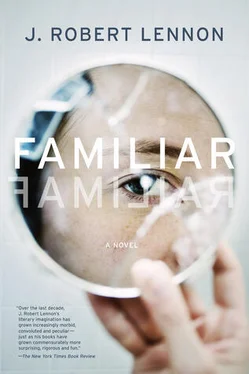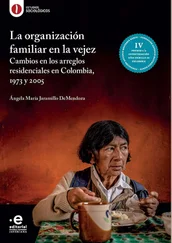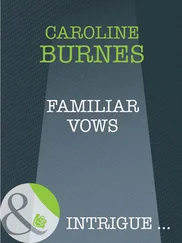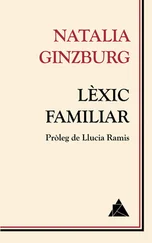Betsy’s answer, littered with finger quotes, is given with a wrinkled brow. Elisa is trying to concentrate on it. “I’m not sure if that’s a question for physics. I mean, we’d need to define what ‘consciousness’ means, in terms of physics. If you want to get philosophical… in theory… I guess ‘you’ are already there, the iteration of you that is native to that universe.”
“But is there… can you think of a mechanism… by which…”
“He’s not taking no for an answer!” quips the blogger.
“… by which the consciousness could travel… could be transferred…”
“Into the Matrix!” the blogger says.
“… or I guess shared with that of the other you, or yous?”
Betsy leans forward. “Believe me, I want to say yes…”
“So say yes!” says the blogger.
“… but physics is concerned with the kind of questions that we can support with mathematics or experimentation. ‘Consciousness’ is a psychological notion, a philosophical notion. It is interesting, but it isn’t something we can apply freely to our work. I can’t say that something like consciousness can be transferred because I don’t know what it consists of. And neither does anyone else.”
Yes. Yes, Elisa is thinking, nobody knows, nobody understands. And this ought to reassure her, because it means that whatever she wants to be true about this experience, whatever she would like to believe has happened to her, is possible. It doesn’t matter what Betsy Orosco or Hugo Bonaventure thinks, it doesn’t matter what the guy at Caltech thinks, it doesn’t matter what Amos Finley thinks. They can’t tell her otherwise, can they? — because they don’t know. They can’t know. The only person who can decide what it is that has happened to her is herself: the experience is hers to define, and hers to explain or not. Her life, her consciousness.
But instead of feeling reassured, she begins to feel panicked. Because it occurs to her that what she wants — what she has wanted all along — is not simply to know. It is to be believed. She has placed her greatest need in the hands of other people — strangers in an alien world.
They are all strangers here, even herself.
Elisa senses a movement to her right. It is Patricia. She is placing a twice-folded rectangle of paper on the seat between them.
Elisa leaves the paper there. She knows it is for her but can’t bring herself to pick it up. The room is decorated in various shades of beige and gray and the paper is the whitest thing in it. It lies slightly open, the four corners lined up sharply, pointed at her. She can see into its maw, where a few lines of text have been printed.
The science fiction writer is speaking now. Somebody has asked him how parallel worlds should be depicted in stories, if the concept is bound by rules. His response is impatient; he speaks as though it is beneath him to be asked such a thing.
“Every compelling concept is bound by rules. But I can’t sit here and tell them to you. They’re determined by the story.”
But Elisa is still staring at the paper. She detects movement and looks up to find that Patricia has turned her head and is gazing at her with moist and beatific eyes, smiling faintly, pitying her. Patricia blinks — no, she bats her eyelashes. The smell of her perfume is stronger now.
And now Patricia stands up and walks, floats almost, out of the room. To Elisa this seems disruptive, drastic: isn’t there a kind of hush in the room just now, a suspension of movement and sound? But nobody seems to notice it happening. All that is left is the paper on the chair and the voice of the science fiction novelist.
“… for instance, in my last book, Familiar, which maybe some of you have read…”
“Very fine piece of work,” says the TV producer.
“Why, thank you, Roland, have your people talk to my people. But in that book, the protagonist, a young man in search of his twin, enters parallel worlds through the pages of a book, a sort of enchanted book also called Familiar… ”
The blogger says, “Everybody loves the po-mo,” to scattered laughs.
Elisa is only half-listening. She reaches out and picks up the paper. Her dry hands make a sharp sound, sliding against it, unfolding it. She looks up to see if anyone has noticed. But nobody is paying attention.
The message has been printed on a computer. It reads:
I know what you are going through… I can help you… I will come to you… we will talk… a better life awaits… don’t worry. There is an answer to all your questions… a solution to your problems… don’t worry… soon. Patricia.
Somehow the message reads like a code — it seems to say more than is printed here. She reads it again and again, straining against the possibility of hope. Could Patricia be the one? Why not? Someone just said something about the rules being determined by the story. This is her story, isn’t it? She, Elisa, can make the rules.
The voices of the panelists fall silent. She looks up and catches Betsy frowning at her from the dais, as though trying to figure something out.
Elisa’s fingers begin to twitch. The paper in her hand crackles and she rises to her feet. She’s angry.
“Betsy!”
The room turns to her. There’s a wildness in her voice, a raggedness that is almost sexual. Her breaths catch in her throat and suddenly her heart is pounding so frantically against her blouse that she thinks she can see, on the periphery of her vision, the fabric moving. She tries to calm herself, to tamp down the desperation in her voice, but it’s hopeless. She says, “I wonder if you might talk about my experience of this phenomenon. What we talked about last year. And where you stand on that.”
Someone coughs. The silence deepens. Betsy opens her mouth to speak, then closes it again and glances at the papers in front of her. She looks up and says, “I know that… I’m not sure…”
“You sent me to your friend Hugo. He was going to do tests… well, he was going to have his friends do them. Tests. On my things.”
She doesn’t sound like herself at all.
“A tube of lipstick. And a list. One from both worlds, one from this one alone!”
Betsy is frowning again. She says, “I don’t think…” and then trails off. She’s gripping a pen in her fist and is clicking the nib in and out with her thumb.
“I went there — to the lab. They gave me my things back. They didn’t know you, or Hugo.”
Into the eerie quiet of the room, Betsy says, “I’m sorry, I don’t know anything about that.”
Elisa says, too quietly to be heard, “Did you ever believe me?”
And by now someone else has raised a hand, asked the TV producer a question. Elisa is still standing, still staring at Betsy, who is still clicking her pen. Eventually Betsy looks away, and Elisa sits down. She is not entirely sure what specifically she just said. The folded note is still in her hand. Her heart is still racing.
And then the room is empty, or nearly so, the neat rows of folding chairs have been disrupted and young people wearing eyeglasses and ID tags are bustling about pushing them back into place. Some people are standing near her, it’s nottennis and RueTheDay. There’s an electric, frightened intensity about them: at first she assumes it’s because they are attracted to one another, that RueTheDay is contemplating an affair. And maybe they are, maybe he is. But then she asks them what they’re doing next, are they going to the movie premiere in the ballroom, and they are strangely evasive. Nottennis takes a step back, bumping into someone to whom she must apologize.
“Uh… yeah,” says RueTheDay, “I think maybe we’ll make our way there eventually.”
Читать дальше












